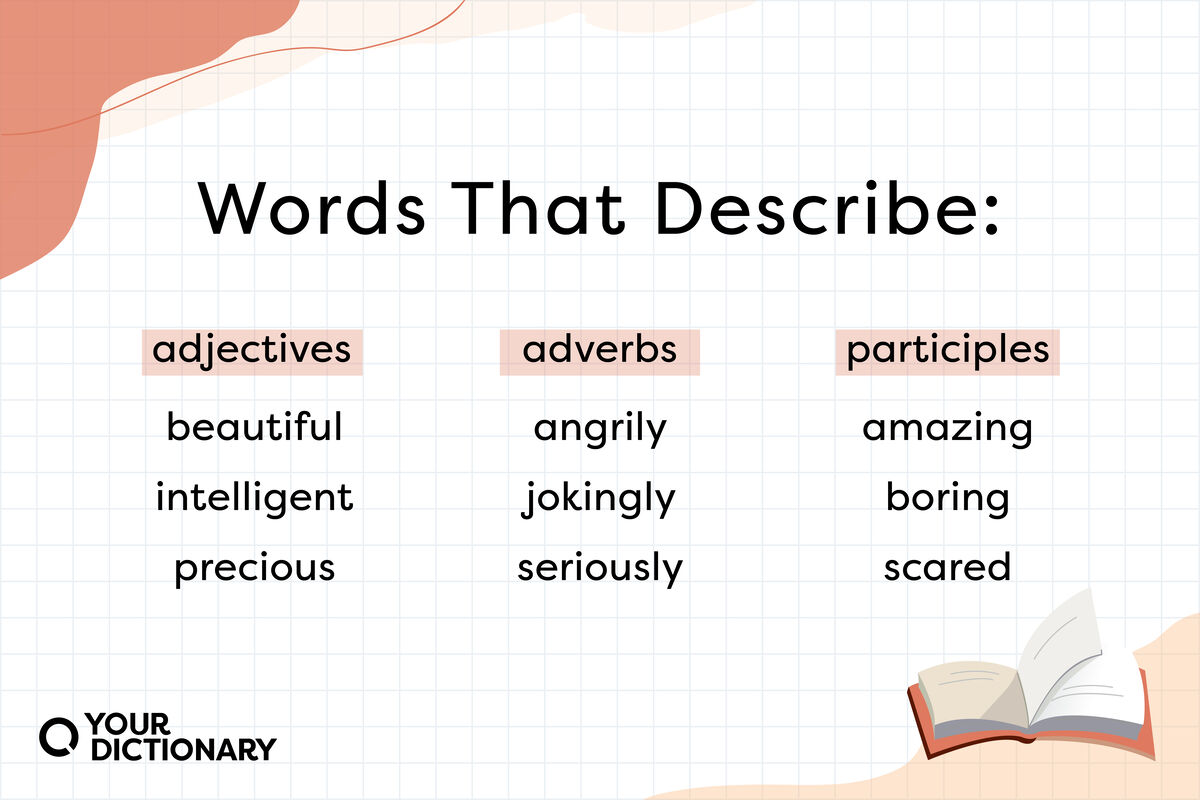
Descriptive words help paint a picture in the reader's mind. They can be adjectives, adverbs, or participles that describe the subjects or actions of your sentence.
Using descriptive words can bring characters to life in a novel or short story, sell an item in a product advertisement, convince an audience in a persuasive writing piece, explain the setting of a news story, or provide instructions for a DIY project. Using illustrative descriptors makes your writing impossible to put down because your sentences are more vivid.
For example, the sentence "It was windy," might give the reader information, but it's not very descriptive. Instead, you could use descriptive words like:
- gusty
- torrential
- breezy
- windswept
Adjectives as Descriptive Words
Adjectives are descriptive words that modify nouns. They’re what you need to tell the difference between an acrobatic cat, a delirious cat, and a precious cat (or maybe a cat that’s all three).
|
acrobatic |
adorable |
adventurous |
|
bitter |
boundless |
bright |
|
brilliant |
brittle |
delirious |
|
diminutive |
exultant |
filthy |
|
foolhardy |
gregarious |
intrepid |
|
jocular |
joyful |
jubilant |
|
keen |
kooky |
lanky |
|
lazy |
limp |
lush |
|
luxurious |
macabre |
magnanimous |
|
mellow |
miserable |
nimble |
|
nocturnal |
opulent |
ornate |
|
ordinary |
palatial |
parsimonious |
|
peevish |
picturesque |
potent |
|
practical |
precious |
putrid |
|
questionable |
quirky |
radiant |
|
raspy |
rustic |
scornful |
|
scrumptious |
silky |
sly |
|
spider-like |
spectacular |
tentacular |
|
tense |
thorny |
verdant |
|
whimsical |
woeful |
zesty |
Adverbs as Descriptive Words
Use an adverb to describe an action rather than a noun, or if you want to add even more detail to an adjective. Most adverbs end in -ly (though not all of them), and they’re helpful ways to strengthen your writing.
|
amusingly |
angrily |
apathetically |
|
assertively |
begrudgingly |
blissfully |
|
blithely |
boldly |
boisterously |
|
chillingly |
coyly |
darkly |
|
dazzlingly |
deafeningly |
dutifully |
|
eagerly |
facetiously |
faintly |
|
falteringly |
frivolously |
greedily |
|
grimly |
gloweringly |
guiltily |
|
hastily |
hungrily |
intelligently |
|
kindly |
lavishly |
lazily |
|
listlessly |
masterfully |
meagerly |
|
methodically |
naively |
narrowly |
|
neglectfully |
nerve-wrackingly |
numbly |
|
offensively |
passionately |
pleasantly |
|
pointlessly |
quickly |
rapidly |
|
rashly |
secretly |
seriously |
|
swiftly |
tactfully |
teasingly |
|
tenderly |
timorously |
tragically |
|
underhandedly |
vacantly |
vividly |
|
weirdly |
youthfully |
zealously |
Participles as Descriptive Words
You can even use verbs as describing words — although they’re called participles in that context. Past participles end in -ed or -en, present participles end in -ing, and they all look like descriptive words that you probably use all the time.
|
acclaimed |
accomplished |
amazing |
|
amused |
baby-faced |
battered |
|
beaten |
bleeding |
boring |
|
broken |
blushing |
bow-legged |
|
captivating |
cluttered |
confusing |
|
chosen |
complicated |
condemned |
|
crystallized |
customized |
dazzling |
|
depressed |
disgusting |
distressing |
|
disturbing |
dreaming |
driven |
|
dyed |
embarrassing |
exciting |
|
far-reaching |
fascinated |
freckled |
|
frustrating |
hard-hearted |
humiliating |
|
interesting |
irritating |
lying |
|
melted |
mouthwatering |
peaked |
|
puzzling |
relaxing |
riveting |
|
satisfied |
scared |
scented |
|
shocking |
sickening |
side-splitting |
|
staggering |
sweeping |
tattered |
|
threatening |
thrilled |
tired |
|
towering |
weathered |
wrinkled |
Describing Our World With Words
When it comes to using descriptive words, variety is key. Go beyond the list of adjectives, adverbs, and participles above to help you set the scene with just the right imagery.
- Appeal to your readers' senses with a list of strong sensory words.
- Use descriptive words for scents to describe pleasant (or unpleasant) smells.
- Describe an aquatic scene with water words for descriptive writing.
- Learn to describe a person’s (or character’s) physical appearance.
- Choose the right descriptive words to describe someone’s personality.
- Paint a delicious picture with descriptive language for food.